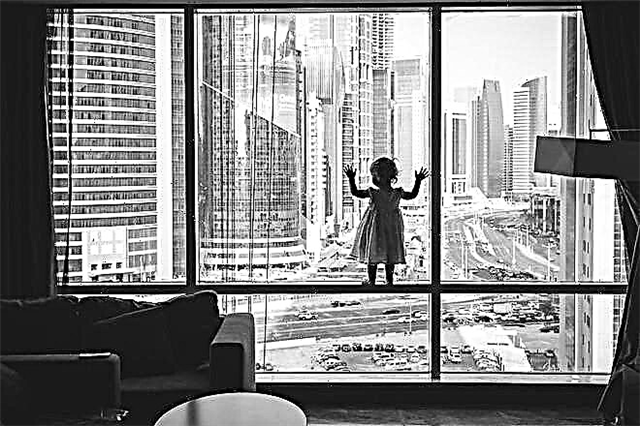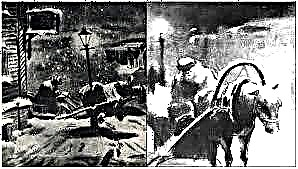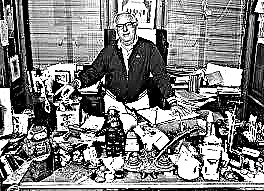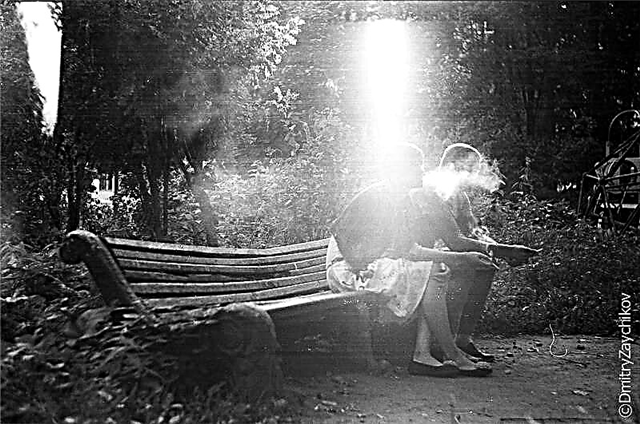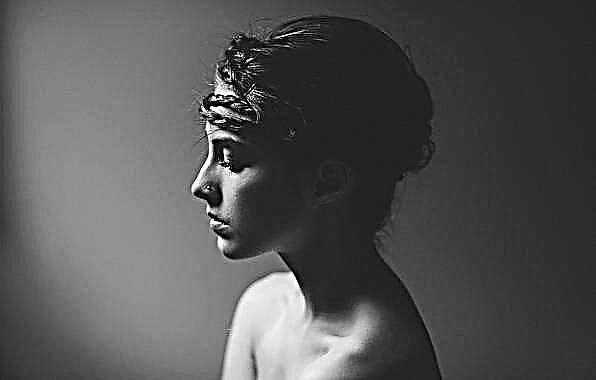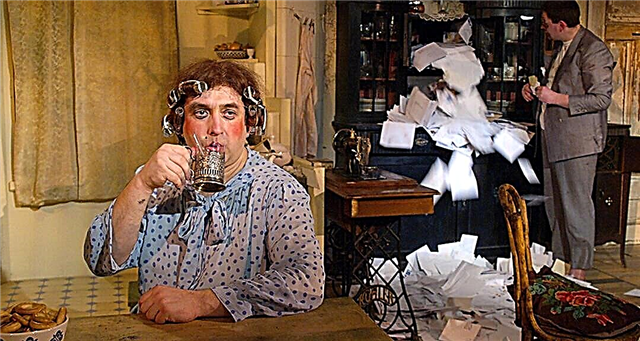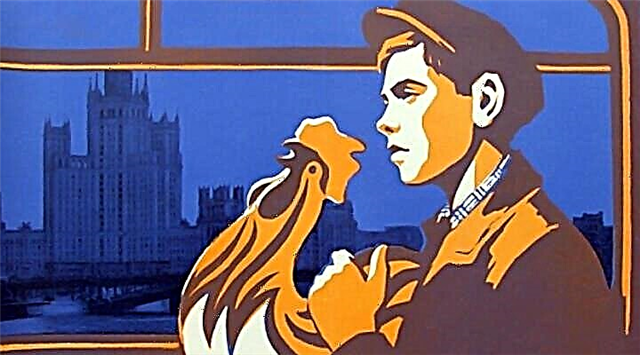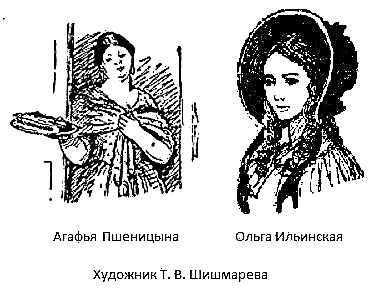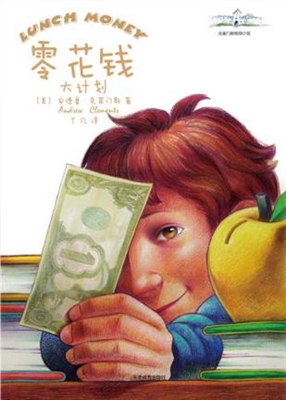Laurence, a beautiful young woman, at first glance has everything she needs for happiness: a loving husband, two daughters, an interesting job, wealth, parents, friends. But Laurence, alienated looking at all this well-being, does not feel happy. She notices emptiness, the worthlessness of small talk about everything and about nothing, she sees all the falsity of the people around her. At a party with her mother and her lover, it seems to her as if she had already seen and heard all this. Dominica, her mother, is considered an example of good manners, she left her father, who was never able (or rather, did not want to) make a career for the sake of the rich and successful Gilbert Dufren, and everyone admires how friendly and beautiful they are - a pretty picture. Dominica and Laurence brought up as a “lovely picture”: a perfect girl, a perfect teenager, a perfect young girl. Laurence memorized smiles, perfectly keeps on people. Five years ago, she was already depressed, and she was told that many young women go through this. Now she again suffers causeless longing. The eldest daughter, Laurence, ten-year-old Catherine cries in the evenings, she is worried about "non-childish" questions: why not all people are happy, what to do to help hungry children. Laurence is worried about her daughter: how to answer her questions without worrying the soul of an impressionable girl? And where does the child get such problems? Laurence also thought about serious things when she was a child, but then there was another time: when she was as old as Catherine, it was 1945. Laurence works in an advertising agency, advertising - the same lovely pictures, she successfully invents baits for gullible people. Her lover, Lucien, arranges scenes of jealousy for her, but Laurence is already burdensome with her: from the old impulses of passion there is no trace left, in fact, he is no better than her husband Jean-Charles, but she is connected with Jean-Charles by the house, children .. She still meets with Lucien from time to time, but since she has no great desire to see him, it is becoming increasingly difficult for her to make time for dates. She is much more pleasant to communicate with her father: he knows how to truly love, to truly appreciate, he is not capable of compromises, he is indifferent to money. She consults with him about Catherine. Her father advises her to meet her new girlfriend Catherine, to look at her. Jean-Charles is trying to lull his daughter with sweet tales about the future happiness of all people on the planet, in every way to protect her from reality. Laurence cannot decide how to reconcile Catherine with reality, and vaguely feels that lying is not the best way to do this.
Mother's lover Gilbert unexpectedly asks Laurence for a meeting. She is worried, suggesting that this is no accident. Indeed, Gilbert directly declares to her that he is in love with a young girl and intends to part with Dominica. The wife finally agreed to give him a divorce, and he wants to marry his lover. Gilbert asks Laurence not to leave his mother: tomorrow he will tell her about the breakup, it is necessary that someone close to her be in difficult times. Gilbert does not feel any guilt before the woman with whom he lived seven years. He believes that a woman who is fifty-one years old is older than a man who is fifty-six, and is sure that nineteen-year-old Patricia sincerely loves him. Laurence hopes that Dominica will be rescued by pride. She has to play the difficult but beautiful role of a woman who accepts a break with elegance. When the next day, Laurence comes to her mother, she pretends to know nothing. Dominica can’t put up with the gap, she wants to return Gilbert by all means. He did not tell her who his lover was, and Dominica was at a loss. Laurence does not betray Gilbert, so as not to upset his mother even more. When she returns home, Catherine introduces her her new girlfriend. Brigitte is a little older than Catherine, her mother died, the girl’s appearance is quite abandoned, the hem of her skirt is pierced with a pin. Brigitte seems much older than the infantile Catherine. Laurence recalls how once Dominic, protecting her from unwanted contacts, did not let her make friends with anyone, and she was left without friends. Brigitg is a nice girl, but does Laurence ask herself if she influences Catherine well. Laurence asks the little girl to talk with Catherine about sad things.
Laurence and Jean-Charles go on a weekend to the Dominic village house. Among the guests are Gilbert. Dominic tells everyone that he and Gilbert are going to Christmas in Lebanon. He had promised her this trip for a long time, and she hopes that if she tells everyone about it, he will be ashamed to refuse it. Gilbert is silent. Laurence advises him to refuse the trip without saying anything about Patricia - Dominic will be offended and will break with him herself. When Laurence and Jean-Charles return to Paris, a cyclist unexpectedly drives out onto the road. Laurence, who drives the car, turns sharply, and the car capsizes into a ditch. Neither Laurence nor Jean-Charles were injured, but the car was shattered. Laurence is glad she did not crush the cyclist. Jean-Charles is upset: the car is expensive, and insurance does not provide for damages in such cases.
Dominica finds out that Gilbert is going to marry Patricia, the daughter of her former lover. Gilbert is very rich, and a break with him means for Dominica and the rejection of luxury. She is not able to survive this and, no matter how Laurence tries to dissuade her, she writes a letter to Patricia, where she tells her the whole truth about Gilbert. She hopes that the girl will not tell Gilbert anything, but will break with him. She is mistaken: Patricia shows a letter to Gilbert, and he gives Dominica a slap in the face. In a conversation with Laurence, Dominica is watering Patricia with a swearing.
Laurence discusses with Catherine the behavior of Jean-Charles. She began to study worse, she cheers on her parents. Jean-Charles is unhappy with her friendship with Brigitte: Brigitte is older, moreover, a Jewess. In response to Laurence's perplexed question, he says that he meant only that Jewish children are distinguished by their premature development and excessive emotionality. Jean-Charles suggests showing Catherine a psychologist. Laurence does not want to interfere in the inner life of her daughter, does not want Catherine to grow as indifferent to other people's misfortunes as Jean-Charles, but still gives consent. The whole family celebrates the New Year with Martha, Laurence's sister. Martha believes in God and is trying hard to impose her beliefs on her close ones. She condemns Laurence for not taking Catherine to church: faith would return the girl's peace of mind. Dominic usually spent this day with Gilbert, but now her daughters were invited. Dominic speaks amiably with his ex-husband, father Laurence and Martha. Father invites Laurence to go together to Greece. There, Laurence at some point realizes that his father is no better than others, that he is as indifferent as others, that his love for the past is the same escape from life as Jean-Charles’s reasoning about the future. Laurence falls ill. Upon returning to Paris, she feels that her house is no closer to her than the stones of the Acropolis. Everything around is alien, no one is close to her, except Catherine. Brigitte invites Catherine to spend an Easter holiday together in their village house. Laurence wants to let her daughter go, but Jean-Charles objects. He suggests, so as not to upset Catherine, to go to Rome together, and then to carry Catherine on horseback riding - then she will not have time to meet Brigitte. The psychologist believes that the impressionable Catherine is better protected from shocks. Father Laurence also advises to listen to the opinion of a psychologist, Catherine is upset, but ready to obey. Laurence worries, everyone persuades her not to make a tragedy out of such a trifle. Dominica reports that he and father Laurence decided to live together. She believes that the couple, having regained each other after many years of separate life, in order to meet the impending old age together, should look decent. Laurence finally realizes that she was disappointed in her father. Her illness, which manifests itself primarily in nausea, is despair. She is sick of her own life, of herself. She doesn’t know if there is a mole of a mole to open her eyes - after all, there is still darkness all around. But she doesn’t want Catherine to become what everyone else is trying to do her, she doesn’t want Catherine to look like her, that she could neither love nor cry. Laurence lets Catherine go on vacation to Brigitte.


